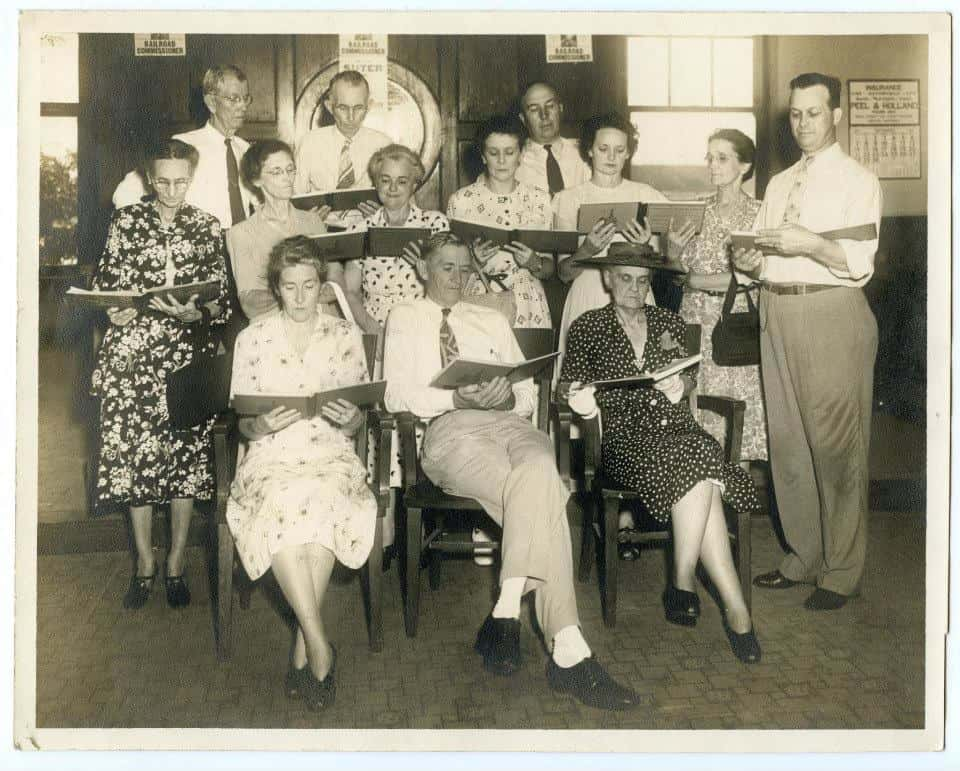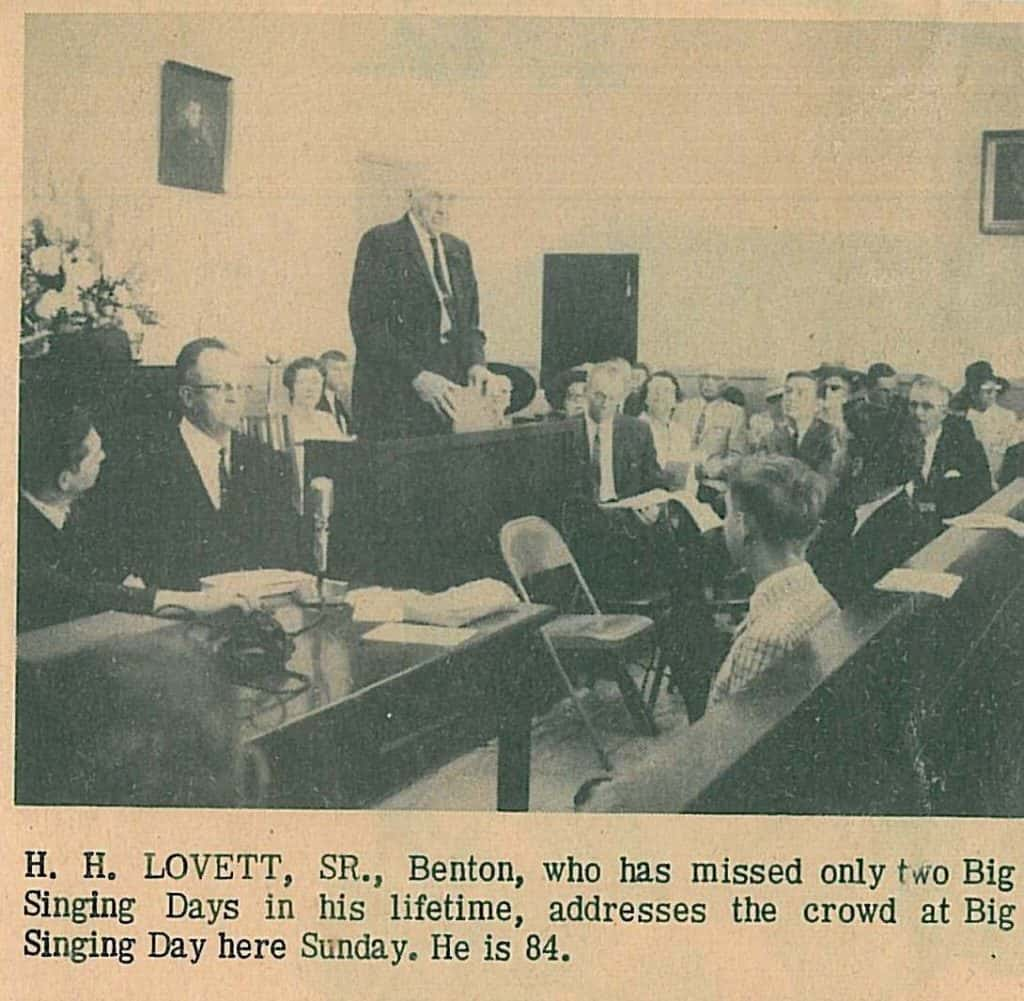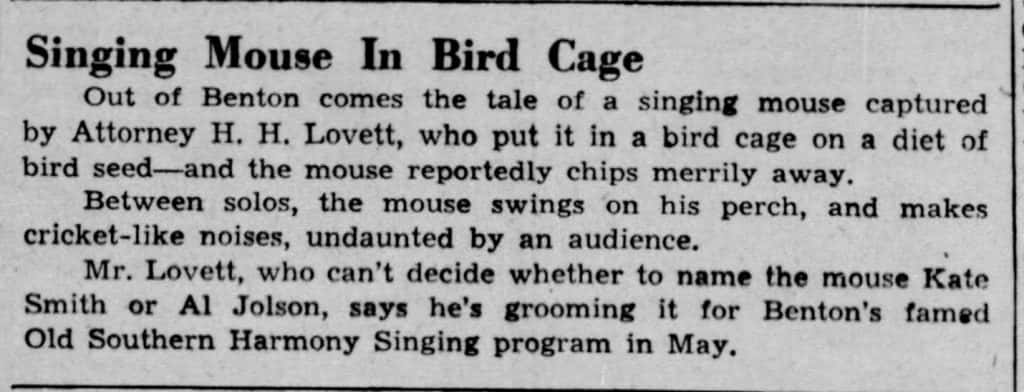THE LIFE OF JUDGE H.H. LOVETT
PART 7
COMMUNITY LEADER
Written by Justin Lamb
H.H. Lovett often spoke with pride of Marshall County and he spent his entire career volunteering for several non-profit and civic organizations. In the early 1930s, Lovett and several civic and business leaders founded the Benton Young Men’s Progress Club (BYMPC). The goal of the club was to promote Marshall County and help with growth and development of the county. Lovett was actively involved from the beginning and one of the first projects of the club was to finance and oversee the installation of stop signs and traffic lights in Benton.
The most successful project of the BYMPC was to secure Benton as the location of the General Cigar Factory. After several trips to New York City to speak with company executives, the factory opened in Benton in 1944 and was a distributor for White Owl Cigars. Lovett, who loved a good cigar, must have been pleased that a cigar factory located to his hometown. The factory remained open until 1949. The BYMPC eventually evolved into the Marshall County Rotary Club.
***
Since his childhood, Lovett was active in Big Singing Day and every year on the fourth Sunday in May, he and his family would make the trip to Benton to attend. Throughout his life, Lovett attended almost every session of the Southern Harmony singers. In an interview in 1970, Lovett recalled his participation in the annual event, “I am a little older than the singing itself. I can’t remember the first one or the second one. Since then, I’ve attended all except three. Twice I was away in school. Once I was sick.”
Lovett also recalled the early years of the event, “I do remember three held outside of Benton prior to 1890. One was held at Briensburg, one at Olive, and one at Hardin.” Lovett continued, “I recall the year Big Singing was held at Hardin. That was in 1890. Hardin at that time was a new town. The railroad had just been built. There were no streets, graveled or paved. There were no sidewalks or anything else. It rained and rained and rained. There was more mud that you could imagine and when I got out of the conveyance I fell in the mud with my new pants on! Those were one of the very first pair of store bought pants I had ever had and they were ruined by the mud.”

Practice session for Big Singing Day 1945. Judge Lovett(seated in the middle) was active in preserving the singing style and only missed two sessions of Big Singing Day his entire life.
(Courtesy of Big Singing Collection, Gene Gilliland)
As Lovett grew older, his love for Big Singing Day only intensified and he worked to preserve the Marshall County tradition. In 1939, he spearheaded a drive within the Benton Young Men’s Progress Club to have the Big Singing songbooks reprinted so future generations would be able to learn the unique music style. Lovett and Ben Lomond Trevathan (Bank of Marshall County) traveled to Washington, D.C. and received assistance from the Federal Writers Project. Two thousand copies were printed and sold throughout the community for two dollars a copy.

After a sharp decline of Big Singing Day during the Depression years, Lovett served on the Big Singing Publicity Committee which led to a revival of the singing event and by 1948, Big Singing Day saw a record crowd of 12,000 visitors in the town of Benton. Throughout his professional career, Lovett gave the opening statements at both the morning and afternoon sessions, prepared the programs, and served as master of ceremonies for the event.
***
During the late 1930s, all government and civic officials in Marshall County were working together for one common goal—— to persuade the Tennessee Valley Authority to construct the Kentucky Dam at Gilbertsville. One of the TVA’s requirements of locating to Marshall County was the re-financing of the county’s bonds.
The Marshall County Fiscal Court hired Lovett to work with the Cincinnati Bond Company on re-financing the county’s bonds. However, the bond company was hesitant to re-finance the bonds because of the county’s enormous debt and county had just been named the poorest county in the Commonwealth of Kentucky.
While meeting with the bond company, one of the top executives frankly told Lovett, “I don’t think much of your Marshall County bonds. Marshall County has no potential. With all of this property being taken over by the TVA, how will the county ever develop?”
Lovett replied, “Sir, I have enough confidence in the future of Marshall County to believe that there will be more development in the county because of TVA.” Although hesitant, the executive trusted Lovett enough and approved the re-financing of bonds.
The following year on July 1, 1938, construction began on the Kentucky Dam and Marshall County was on the road to positive change. “Thanks to the Kentucky Dam, I have seen Marshall County grow from a poor county, one badly in debt, with an assessed valuation of three million to over hundred fifty million, paved roads all over the county, and money to pay its debts.” Lovett proudly said in a 1970 interview with the Marshall Courier.
After the dam was completed and dedicated by President Harry Truman in October 1945, the Kentucky Lake Association was formed by businessmen and civic leaders of all eight counties of the Purchase Area for the purpose of developing Kentucky Lake for economic growth. Henry Lovett was appointed to the committee and later elected a member of the Executive Committee during its formative years.
Lovett served as the attorney for the Bank of Benton in the mid-1930s and until his retirement in the late 1950s. Around 1936, Lovett he was hired as a consultant for the Federal Land Bank in Louisville, Kentucky which was the bank in charge of buying up the land along the Tennessee River for Tennessee Valley Authority.
***
During the summer of 1937, Ben Lomond Trevathan, President of the Bank of Marshall County, met with Lovett and Benton Attorney Walter Prince about forming a committee to get a local option law placed on the books banning the sale of alcohol in Marshall County. A devout Methodist, Lovett supported prohibition and committed to the effort of making Marshall County “dry” and to clean up the roadhouses and illegal gambling rings in the county.
Shortly after, a “Dry Committee” was formed at the courthouse and petitions began circulating around the county to get the measure placed on the ballot. The churches in the county quickly got behind the movement and after the necessary signatures were gathered, County Judge John D. Hall placed the measure on the ballot in December 1937.
The Dry Committee met opposition from local saloon keepers and liquor store owners who naturally wanted the county to remain “wet.” On the day of the vote, the local option measure passed by a comfortable margin, thus outlawing the sale of alcohol in the county. However, the victory was short lived when the election result was declared invalid after the County Clerk did not file the local option petitions in open court by the appropriate deadline. Nevertheless, the Dry Committee reconvened the following year, gathered the necessary signatures, and the measure was placed on the ballot once more in December 1938. This time they made sure the petitions were filed properly and on time. The vote passed and the sale of alcohol ceased in Marshall County.
***

In the late 1930s, Lovett received a great deal of publicity from newspapers as far away as Louisville and Lexington in the late 1930s when he captured a singing mouse. He kept it in a cage in his office and people would come from all around the area to hear the mouse sing. “We would shake the cage and it would sing like a cannery.” Lovett recalled. Lovett had the mouse until he loaned it to a friend. “I loaned the mouse to Weldon Nelson so he could take it to Murray and show it at the college and never saw the mouse again. I don’t know whatever became of my singing mouse,” Lovett said laughing.
